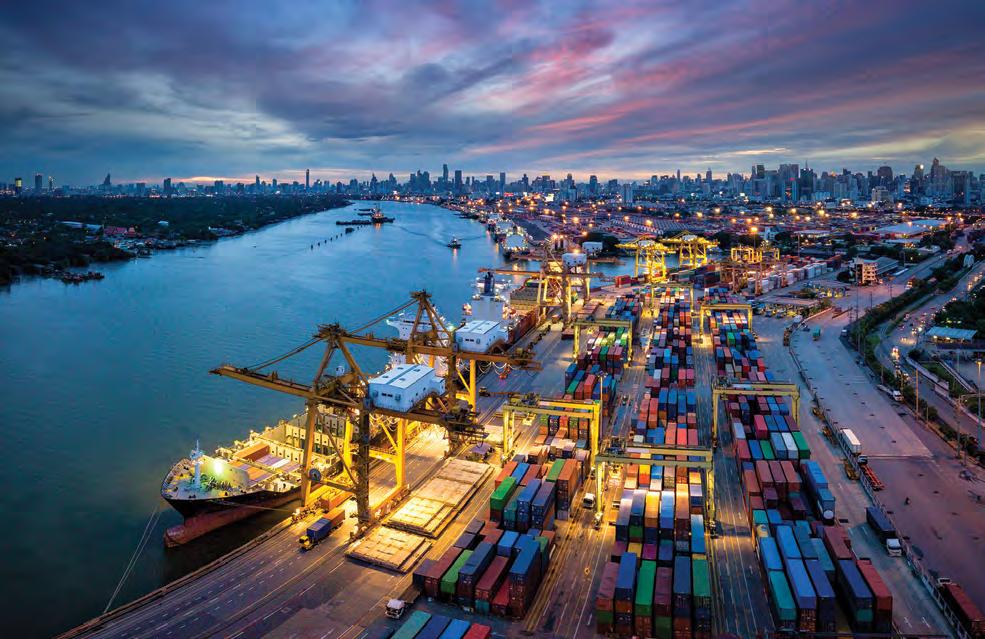
4 minute read
INDUSTRY LOGISTICS
Julian Maynard, Managing Director, Maynard Design
A CHALLENGING NEW ERA IN PARTS DISTRIBUTION
Advertisement
Wondered how logistics for a mining equipment company works? Robert Van der Waal explains how getting parts where they need to be has never been more demanding
If only getting stuff from A to B was as simple as it sounds. Delivering drill rigs and their spare parts to some of the most remote locations on earth has never been easy. But add in a global shortage of key components, bottlenecks in transportation, COVID-19, soaring material prices and a software upgrade at a key distribution centre that went awry, and it’s a wonder that Robert Van der
Waal can get any sleep at night. Van der Waal is the still-new Vice President of Logistics at Parts & Services Division within Sandvik Mining and Rock Solutions. His job is to make sense of all the madness in the logistics sector and ensure that customers get the parts they need, where and when they need them.
Luckily, Van der Waal’s resumé includes a long spell at DHL, and for the last dozen years he’s been a senior executive at Samsung – both companies that know a thing or two about efficient supply chains.
“In 20 years I’ve never seen anything like it, the whole world of logistics has been turned upside down. We just need to figure out how best to operate in this new dynamic,” says the reassuringly calm Van der Waal.
“Some of the problems are out of our hands, but others we brought on ourselves – like a necessary – but challenging – introduction of a new warehouse management system at our central distribution center in Eindhoven, Netherlands, where the majority of our parts are stocked.
“Our customers were undoubtedly inconvenienced, but thankfully have been remarkably understanding. Now that we are back on track, we can reshape our supply chain to suit the new environment, with the support of up-to-date systems.”
Port bottlenecks
This is already happening, with the Eindhoven facility now pushing out
40% more volume than before the system upgrade. Even products stuck in ports such as California’s Long Beach and China’s Yantian are slowly moving through the supply chain. Geopolitics also is causing headaches, such as Mali closing its borders after the recent military takeover, meaning mines can’t be supplied via standard routes. And COVID-19 rules continue to change as the pandemic evolves.
“You only need to see a delay in supplying parts to realise just how important they are to customers,” says Van der Waal.
“They need spare parts to keep operating their mines – and it’s a pain you can’t ignore. So, we have changed our shipping methods. In the past we sent 40% by air, 40% by sea and 20% by road – now as much as 70% of parts are being flown in. This is faster but the costs are enormous. But we have no choice – it’s a price worth paying to keep customers satisfied.”
Delay and costs rise
It’s not just the cost of freight that is going up, everything seems to be – from simple screws and bolts, to the wood used for packaging. Ocean freight prices in particular have skyrocketed – a shortage of ships means that container prices have shot up, from roughly USD2,000 a container a few years ago to as much as USD18,000 today. Sandvik is absorbing much of these increases, but the pressure on costs is intense.
That said, there are some problems that even money can’t fix. The global shortage of semi-conductors is hitting electronic component suppliers, causing delays for the whole industry, and this is unlikely to ease any time soon, believes Van der Waal.
So, what does all this mean in terms of delivery schedules? “I think the ballpark figure is that things now take twice as long as before,” says Van der Waal. “Even express courier services that used to be guaranteed next day delivery can now take two days.”
But does this mean the end of just-in-time logistics? “Not necessarily,” he says. “We just need to adjust our supply chain so that we are still there with the right product at the right time for the customer.
Where historically a supply chain was built around efficiency, the disruptions due to the pandemic and new market dynamics makes companies, including Sandvik, transform their supply structures to make them much more robust. Ones that are better able to handle disruptions and unexpected disturbances.”
Back to basics: key to success
New technology and processes undoubtedly have a role to play in ensuring Sandvik’s parts and equipment get to where they are needed. But rather than take big leaps of faith in new technologies (such as artificial intelligence), Van der Waal is counselling caution, and a more ‘back to basics’ approach. He counsels the use of the philosophy that it’s better to take one step backward in the short term in order to take two steps forward in the future.
“This last year has shown us – painfully – what happens when we lose control of our processes,” he says. “We have to get the oldschool basics of logistics right first, have good relationships with our suppliers and put robust contingency plans in place if situations change unexpectedly.
“New technology is going to play an important part in our future success, but we will only take steps we know we can manage – no more leaps of faith in IT. Getting parts to our customers on time is too important a priority to take risks with.”






